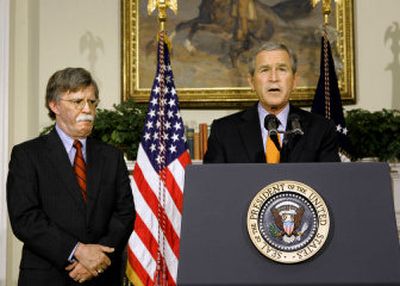Recess appointment a loss for both sides

WASHINGTON – President Bush got what he wanted Monday, but not the way he wanted it. And Democrats received yet another reminder that they’re out of power. There were losses on both sides in the matter of John Bolton’s recess appointment as ambassador to the United Nations.
Senate Democrats twice blocked confirmation votes on Bolton, a nominee Bush fought hard for. Without control of the Senate or the White House, that was all Democrats could do. As soon as they left town for their summer break, Bush played a constitutional trump card used by presidents since George Washington: He gave Bolton the job anyway.
“He’s rubbing their faces with Bolton’s bushy mustache,” said Jack Pitney, a congressional expert at Claremont McKenna College in California who once worked for Republicans on Capitol Hill.
True, Bolton is a temporary employee; he can hold the job for only about 18 months, until the current Congress adjourns. Though he goes to the United Nations with Bush’s backing, he goes without Senate approval after a contentious five-month debate over his temperament, character and record.
Bush has “shown Congress, and especially the Senate, that he’s in charge,” said Paul Light, a presidential appointments expert at New York University. “But the person he’s appointed is going into office under a cloud. It’s like hoping for Tiffany’s and getting the Dollar Store.”
Light called the outcome the result of “breakdowns at both ends of Pennsylvania Avenue.” Lauren Bell, an expert on confirmation politics at Randolph-Macon College in Ashland, Va., said there’s “no clear winner.”
Bell also said she was “shocked” that Bush made the Bolton appointment, given that Supreme Court nominee John Roberts is awaiting Senate confirmation. “If you have a pending Supreme Court nominee, why are you going to antagonize the Senate?” she asked. “It doesn’t really go far in creating good will.”
Democrats did not threaten, at least immediately, to block future Bush nominees. That’s what some Republicans did during the Clinton administration, according to quotations compiled by the Democratic Senatorial Campaign Committee. Democrats argued that Bolton was the wrong person to send to the United Nations, citing testimony that he had pressed analysts to accept his views on rogue nations’ weapons programs – a sensitive issue at the United Nations after U.S. claims that Iraq had weapons of mass destruction proved unfounded. “After all we’ve been through in Iraq with the misuse of intelligence by policy-makers, promoting Mr. Bolton sends exactly the wrong message,” said Sen. Joseph Biden, D-Del., the top Democrat on the Senate Foreign Relations Committee.
Republicans issued statements praising Bush’s move. Sen. George Allen, R-Va., said the tactic was “unfortunately necessary” and called the new ambassador a “well-qualified, principled nominee (with a) desire to bring real reform to the United Nations.”
If Bush wants Bolton to stay on after the recess appointment expires, he could reappoint him during another congressional recess in 2007. Bolton could not be paid during a second recess appointment; he’d have to be volunteer. But a recess appointment can sometimes be a foot in the door that leads to Senate confirmation and greater heights.
Take Thurgood Marshall. In 1961, President John Kennedy got around opposition from white Southern senators by putting Marshall on the 2nd U.S. Circuit Court of Appeals as a recess appointment. Less than a year later, opposition ebbed, and Marshall won Senate confirmation to the 2nd Circuit seat. In 1967, nominated by President Lyndon Johnson, he became the first black justice on the Supreme Court.